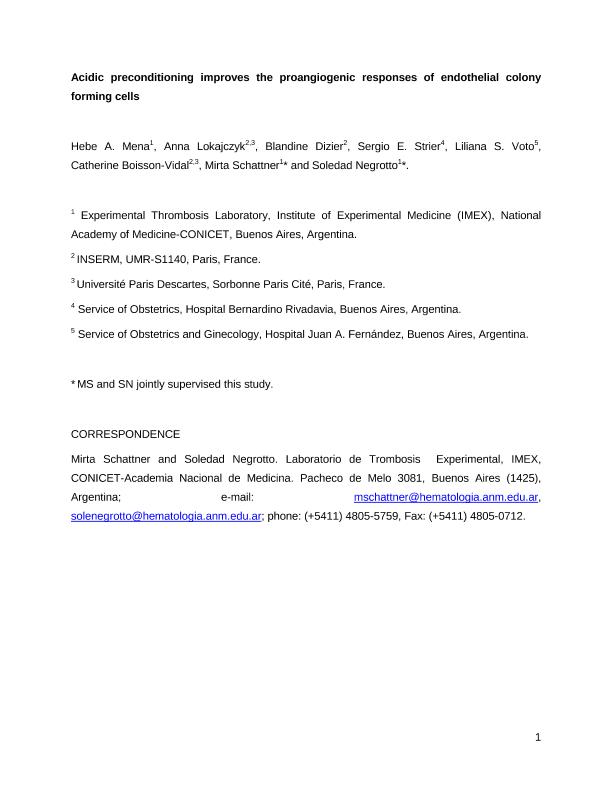Mostrar el registro sencillo del ítem
dc.contributor.author
Mena, Hebe Agustina

dc.contributor.author
Lokajczyk, Anna
dc.contributor.author
Dizier, Blandine
dc.contributor.author
Strier, Sergio E.
dc.contributor.author
Voto, Liliana S.

dc.contributor.author
Boisson Vidal, Catherine
dc.contributor.author
Schattner, Mirta Ana

dc.contributor.author
Negrotto, Soledad

dc.date.available
2017-11-30T22:19:06Z
dc.date.issued
2014-05
dc.identifier.citation
Mena, Hebe Agustina; Lokajczyk, Anna; Dizier, Blandine; Strier, Sergio E.; Voto, Liliana S.; et al.; Acidic preconditioning improves the proangiogenic responses of endothelial colony forming cells; Springer; Angiogenesis; 17; 4; 5-2014; 867-879
dc.identifier.issn
0969-6970
dc.identifier.uri
http://hdl.handle.net/11336/29417
dc.description.abstract
Objective: Acidosis is present in several pathological conditions where vasculogenesis takes place including ischemia, tumor growth and wound healing. We have previously demonstrated that acidosis induces human CD34+ cell apoptosis. Considering that endothelial colony-forming cells (ECFC) are a subpopulation of CD34+ cells and key players in vasculogenesis, in the present study we investigated the effect of acidosis on the survival and functionality of ECFC. Approach and results: Endothelial colony-forming cells obtained by differentiation of human cord blood CD34+ cells in endothelial growth medium-2 for 14–21 days were exposed at pH 7.4, 7.0 or 6.6. We found that acidosis failed to induce ECFC apoptosis and, although an early reduction in proliferation, chemotaxis, wound healing and capillary-like tubule formation was observed, once the medium pH was restored to 7.4, ECFC proliferation and tubulogenesis were augmented. Stromal cell derived factor-1 (SDF1)-driven migration and chemokine receptor type 4 surface expression were also increased. The maximal proangiogenic effect exerted by acidic preconditioning was observed after 6 h at pH 6.6. Furthermore, preconditioned ECFC showed an increased ability to promote tissue revascularization in a murine model of hind limb ischemia. Immunoblotting assays showed that acidosis activated AKT and ERK1/2 and inhibited p38 pathways. Proliferation rises triggered by acidic preconditioning were no longer observed after AKT or ERK1/2 inhibition, whereas p38 suppression not only mimicked but also potentiated the effect of acidosis on ECFC tubule formation abilities. Conclusions: These results demonstrate that acidic preconditioning greatly increases ECFC-mediated angiogenesis in vitro including ECFC proliferation, tubulogenesis and SDF1-driven chemotaxis and is a positive regulator of microvessel formation in vivo.
dc.format
application/pdf
dc.language.iso
eng
dc.publisher
Springer

dc.rights
info:eu-repo/semantics/openAccess
dc.rights.uri
https://creativecommons.org/licenses/by-nc-sa/2.5/ar/
dc.subject
Endothelial Colony-Forming Cells
dc.subject
Vasculogenesis
dc.subject
Acidic Preconditioning
dc.subject
Acidosis
dc.subject.classification
Otras Medicina Básica

dc.subject.classification
Medicina Básica

dc.subject.classification
CIENCIAS MÉDICAS Y DE LA SALUD

dc.title
Acidic preconditioning improves the proangiogenic responses of endothelial colony forming cells
dc.type
info:eu-repo/semantics/article
dc.type
info:ar-repo/semantics/artículo
dc.type
info:eu-repo/semantics/publishedVersion
dc.date.updated
2017-10-09T16:41:35Z
dc.identifier.eissn
1573-7209
dc.journal.volume
17
dc.journal.number
4
dc.journal.pagination
867-879
dc.journal.pais
Alemania

dc.journal.ciudad
Berlin
dc.description.fil
Fil: Mena, Hebe Agustina. Consejo Nacional de Investigaciones Científicas y Técnicas. Instituto de Medicina Experimental. Academia Nacional de Medicina de Buenos Aires. Instituto de Medicina Experimental; Argentina
dc.description.fil
Fil: Lokajczyk, Anna. Université Paris Descartes; Francia. Inserm; Francia
dc.description.fil
Fil: Dizier, Blandine. Inserm; Francia
dc.description.fil
Fil: Strier, Sergio E.. Ciudad Autónoma de Buenos Aires. Hospital "Bernardino Rivadavia"; Argentina
dc.description.fil
Fil: Voto, Liliana S.. Ciudad Autónoma de Buenos Aires. Hospital "Juan A. Fernández"; Argentina. Consejo Nacional de Investigaciones Científicas y Técnicas; Argentina
dc.description.fil
Fil: Boisson Vidal, Catherine. Université Paris Descartes; Francia. Inserm; Francia
dc.description.fil
Fil: Schattner, Mirta Ana. Consejo Nacional de Investigaciones Científicas y Técnicas. Instituto de Medicina Experimental. Academia Nacional de Medicina de Buenos Aires. Instituto de Medicina Experimental; Argentina
dc.description.fil
Fil: Negrotto, Soledad. Consejo Nacional de Investigaciones Científicas y Técnicas. Instituto de Medicina Experimental. Academia Nacional de Medicina de Buenos Aires. Instituto de Medicina Experimental; Argentina
dc.journal.title
Angiogenesis

dc.relation.alternativeid
info:eu-repo/semantics/altIdentifier/doi/http://dx.doi.org/10.1007/s10456-014-9434-5
dc.relation.alternativeid
info:eu-repo/semantics/altIdentifier/url/https://link.springer.com/article/10.1007/s10456-014-9434-5
Archivos asociados
